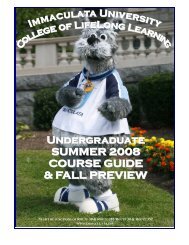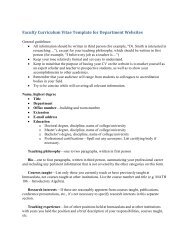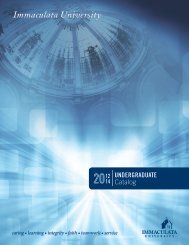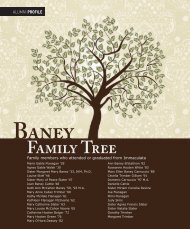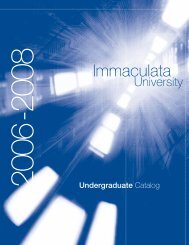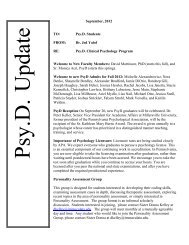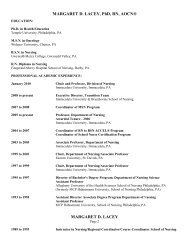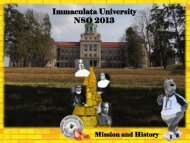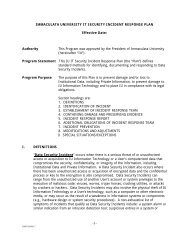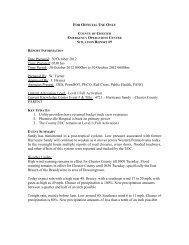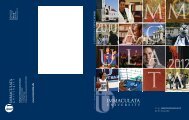Undergraduate Catalog 2008-2010 - Immaculata University
Undergraduate Catalog 2008-2010 - Immaculata University
Undergraduate Catalog 2008-2010 - Immaculata University
You also want an ePaper? Increase the reach of your titles
YUMPU automatically turns print PDFs into web optimized ePapers that Google loves.
Music<br />
National Association of Schools of Music<br />
American Music Therapy Association<br />
Victor Vallo, Jr., Chair<br />
William Carr<br />
Sister Kathleen C. Doutt<br />
Lillian Eyre<br />
Sister Regina Foy<br />
Anthony Meadows<br />
OUTCOMES<br />
• To create an environment for the arts within the academic<br />
community;<br />
• To develop a broad awareness of music as a discipline among<br />
the liberal arts<br />
• To integrate music theory, history and performance within a<br />
comprehensive core program<br />
• To provide professional preparation for service in the fields of<br />
music therapy, music education, and liturgical music<br />
• To assist students in attaining qualifications for music-related<br />
fields and services<br />
REQUIREMENTS FOR ENTRY INTO MAJOR<br />
• A comprehensive Music audition must be passed for entry into<br />
the major. This includes new traditional as well as transfer<br />
students. CLL students who do not already have a bachelor’s<br />
degree in music must also audition for entry as music majors.<br />
• Students studying for certification in education should consult<br />
the education section of this catalog for grade requirements.<br />
REQUIREMENTS FOR FORMAL ACCEPTANCE INTO<br />
MAJOR<br />
• For formal acceptance into the major at the end of the first year<br />
of study, the standing and progress of all freshmen and transfer<br />
music students will be evaluated at the end of the second<br />
semester by a Music Screening Committee consisting of the<br />
full-time Music Department faculty. This committee will<br />
approve by consensus those students accepted into the major.<br />
• Students majoring in any of the five music programs must earn<br />
a grade of C or higher at <strong>Immaculata</strong> <strong>University</strong> in all required<br />
MUSC and MTR courses. In accordance with current<br />
university policy, grades from all transfer music courses must<br />
also be a C or higher. Students earning lower than a grade of C<br />
in any MUSC or MTR course must repeat that course until a C<br />
or higher is earned in that course.<br />
• Students must maintain a cumulative GPA which permits them<br />
to maintain satisfactory academic progress as stated in the<br />
Academic Life section of this catalog.<br />
REQUIREMENTS FOR MAJORS<br />
Students in all five music majors are required to complete the<br />
following General Music Studies Core program:<br />
• General Music Studies Core program: MUSC 090, 105 or<br />
106, 130, 131, 132, 133, 230, 231, 232, 233, 135, 136, 235,<br />
236, 239, 306, 341, 342, 344, 403, 441 large (primary) and<br />
small (secondary) ensembles.<br />
Five Majors are Available to Music Students:<br />
• Music (BA): General Music Studies Core program; MUSC<br />
317, 242 or 321<br />
85<br />
• Music (BA): Music Performance (Vocal or Instrumental):<br />
General Music Studies Core program; MUSC 307, 308, 309,<br />
310, 404.<br />
• Music (BA) with Certification in Elementary Education:<br />
General Music Studies Core program except MUSC 306;<br />
MUSC 314. See the Education section of this <strong>Catalog</strong> for<br />
certification requirements. This program will only be<br />
available to students (CUS and CLL who begin study on or<br />
prior to September, <strong>2008</strong> and who are eligible for PDE<br />
certification by January, 2013.<br />
• Music Education (BMus): General Music Studies Core<br />
program; MUSC 107, 108 207, 208, 105 or 106, 117, 313,<br />
314, 315, 317, 321, 391 (for EDU 381). EDU 301, 302, 310,<br />
330, 325, 381. All students must pass the required level of<br />
proficiency in piano, voice, and guitar before assignment to<br />
student teaching*. Specific Education requirements: See<br />
Education section of this catalog.<br />
• Music Therapy (BMus): General Music Studies Core<br />
program except MUSC 306; MUSC 102 (meets cross-cultural<br />
requirement), 108, 209, 210, 211, 212, 247, 317, 391; MTR<br />
100, 200, 201, 202, 203, 300, 400, BIO 103, 104 (meets liberal<br />
arts core requirement in natural science); PSY 101, 320, 324<br />
(meets liberal arts core requirement in social science).<br />
The Bachelor of Music in Music Therapy prepares students to<br />
practice music therapy in a range of clinical settings. The program<br />
provides training in the musical, clinical, and theoretical<br />
components of music therapy, emphasizing multiple dimensions of<br />
promoting health through music experiences and therapeutic<br />
relationship. The Bachelor of Music in Music Therapy program is<br />
accredited by the National Association of Schools of Music (NASM)<br />
and approved by the American Music Therapy Association (AMTA).<br />
Upon completion of all music therapy course work from MTR 100-<br />
MTR 300 with a grade of C or higher in each, along with<br />
demonstration of functional proficiency on piano, guitar, and voice<br />
(through diagnostic examination administered by music therapy<br />
faculty – [ consult department for specific guidelines]), the student<br />
becomes eligible to enroll in MTR 400 (Music Therapy Internship).<br />
Upon successful completion of MTR 400 and verification of all<br />
professional music therapy competencies, the student becomes<br />
eligible to take the examination administered by the Certification<br />
Board for Music Therapists (CBMT). Upon successful passage of<br />
the CBMT examination, the student earns the national credential of<br />
Music Therapist-Board Certified, or MT-BC. Students may select a<br />
combined accelerated Bachelor of Arts in Music/Master of Arts in<br />
Music Therapy track by electing internship at the graduate level<br />
instead of the undergraduate level (resulting in the awarding of<br />
Bachelor of Arts in Music at the undergraduate level, and<br />
postponement of eligibility for Music Therapy Board Certification).<br />
Consult the College of Graduate Studies for details on the Master of<br />
Arts in Music Therapy program and the application process for<br />
those on the BA-MA track.<br />
ENSEMBLE PARTICIPATION<br />
• All Majors: Large and small ensemble participation and Music<br />
concert and event attendance are required for all music majors as<br />
stated in departmental guidelines and Music Student Handbook<br />
PIANO AND GUITAR PROFICIENCY EXAMS<br />
• Piano Proficiency Exam: All Music Majors must pass a Piano<br />
Proficiency Exam before graduation. This exam may be taken<br />
in sections at different times or it may be taken all at once. It<br />
should be started in Junior year and must be completed by<br />
Senior year in order to graduate.<br />
• Guitar Proficiency Exam: The Pennsylvania Department of<br />
Education (PDE) requires that all music certification



